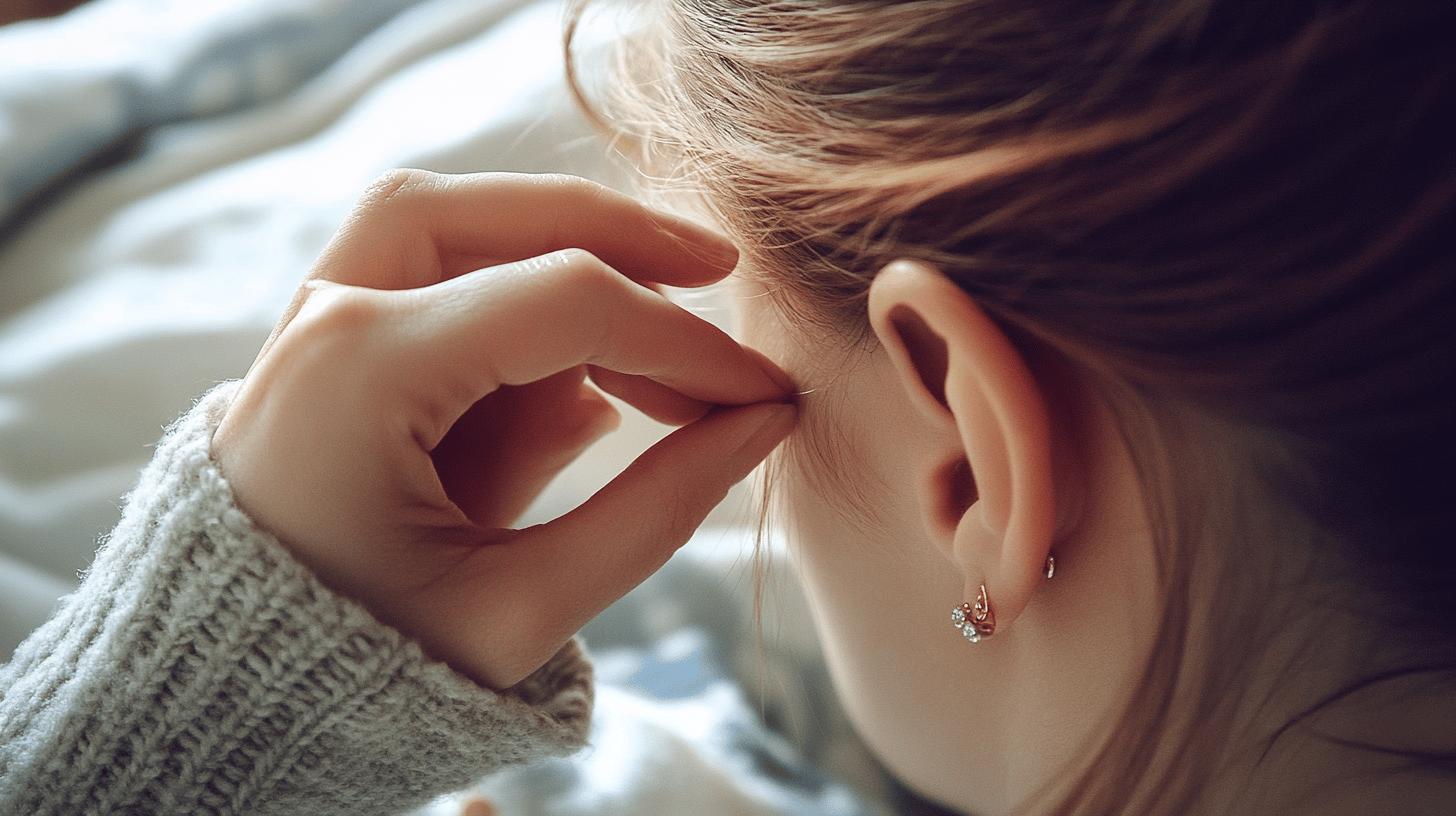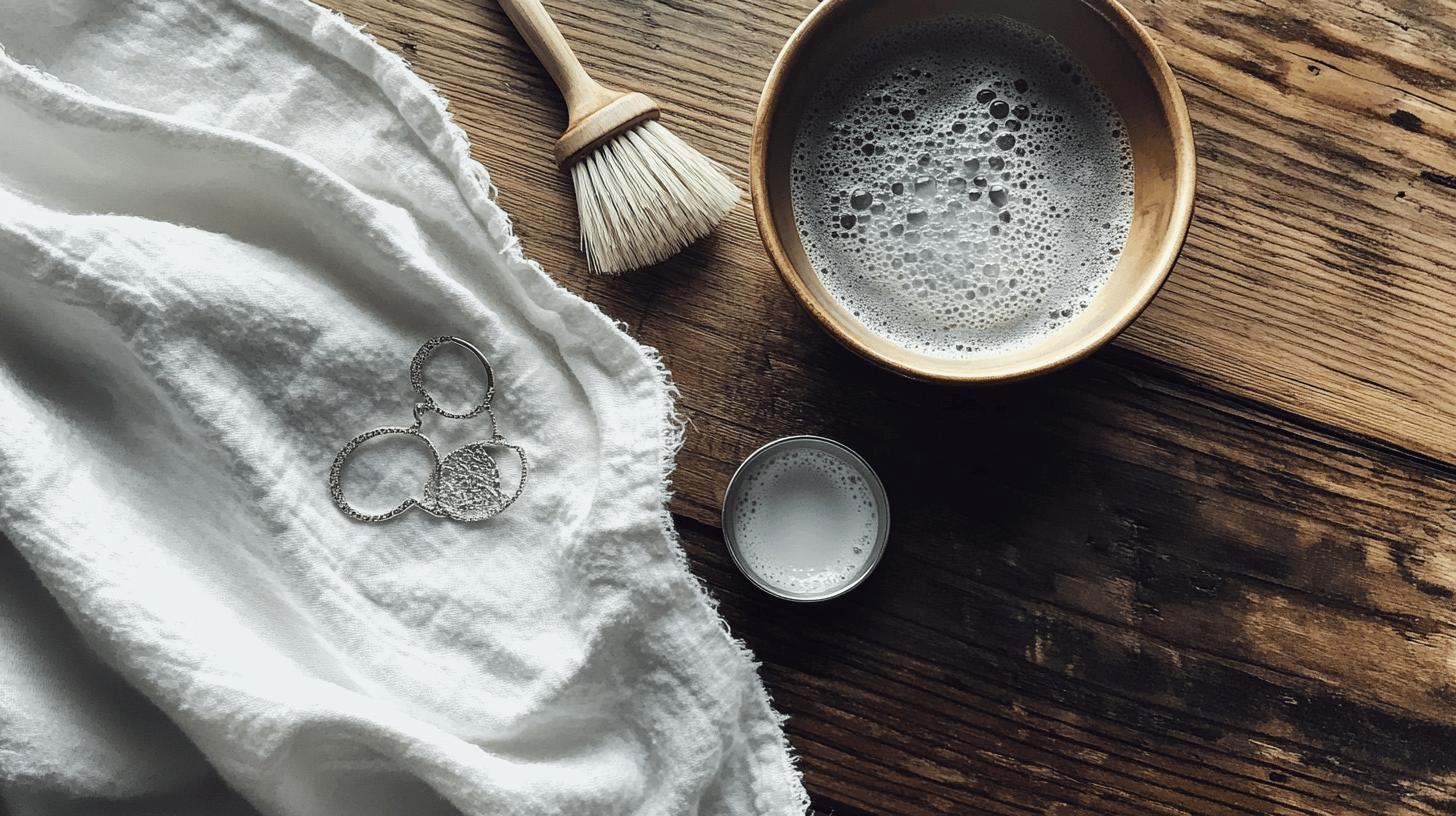
Did you know that your brand-new earrings might not be as clean as they appear? Here is what we suggested on How to Clean New Earrings Safely At home. Many people overlook the crucial step of sanitising new earrings before their first use, but this small action can make a significant impact on your health and the longevity of your jewellery. New earrings can harbour manufacturing residues, bacteria, and dirt from various sources, making cleaning essential. This article will guide you through the safe and effective methods to clean your new earrings at home, ensuring they are ready to wear without compromising your safety or style.
Importance of Cleaning New Earrings
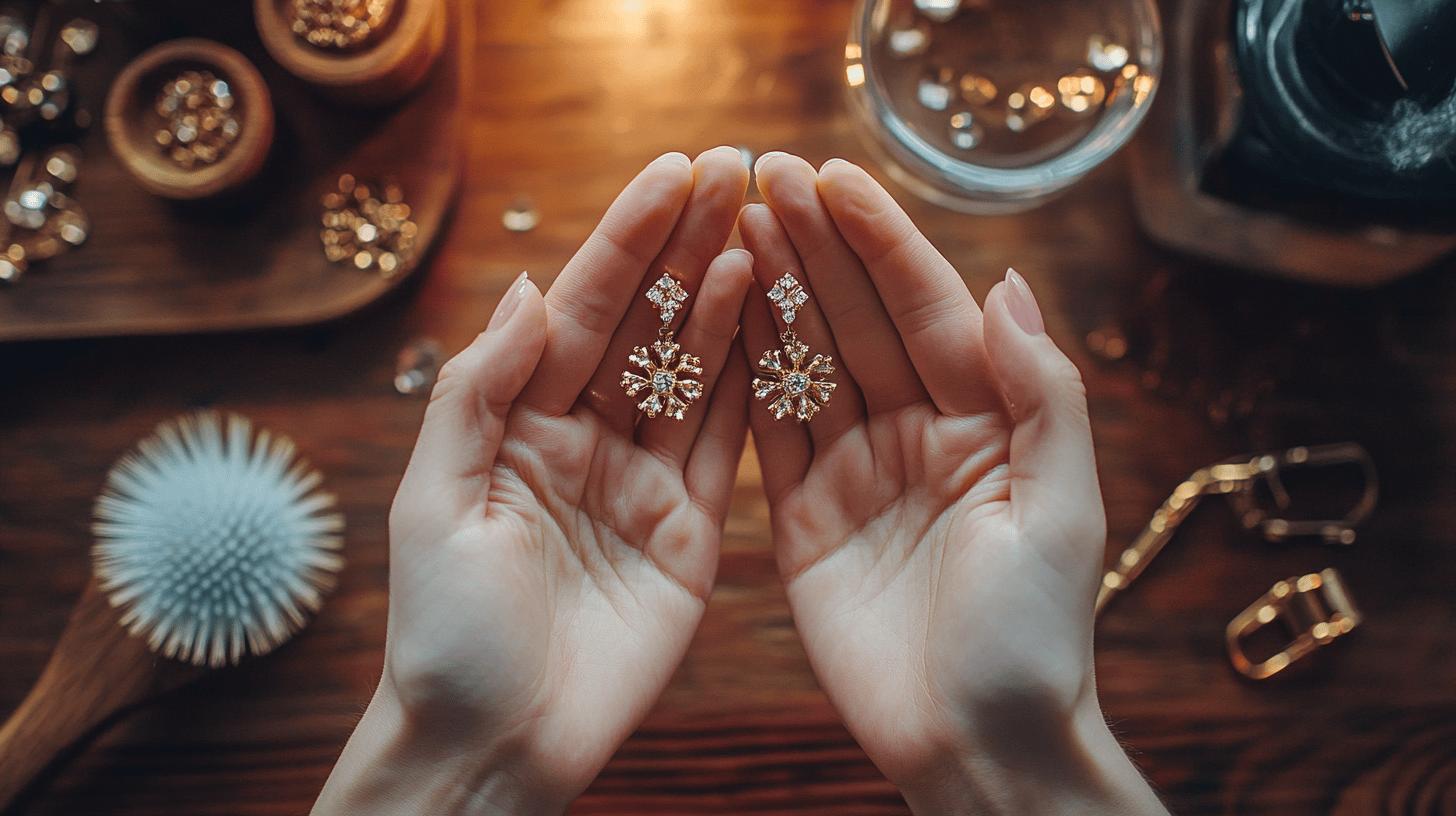
New earrings may carry manufacturing residues or bacteria from the production and packaging process. These contaminants can cause irritation or infections if not properly cleaned before use. Always sanitize newly purchased earrings by washing your hands thoroughly, then using jewellery cleaner, soap and water, or hydrogen peroxide. Rinse with warm water and dry completely.
Earrings can quickly accumulate dirt from various sources, such as air particles, hair oil, and makeup. Frequent cleaning is vital to maintain their longevity and reduce bacteria buildup. Neglecting this can diminish the sparkle of your jewellery and pose potential health risks.
Potential risks of not cleaning new earrings:
- Skin irritation or allergic reactions
- Bacterial infections
- Build-up of harmful residues
- Tarnishing of the earring material
- Premature wear and tear
Regularly cleaning new earrings before wearing them ensures they remain safe and beautiful, preventing unnecessary discomfort or damage.
How to Properly Clean New Earrings at Home
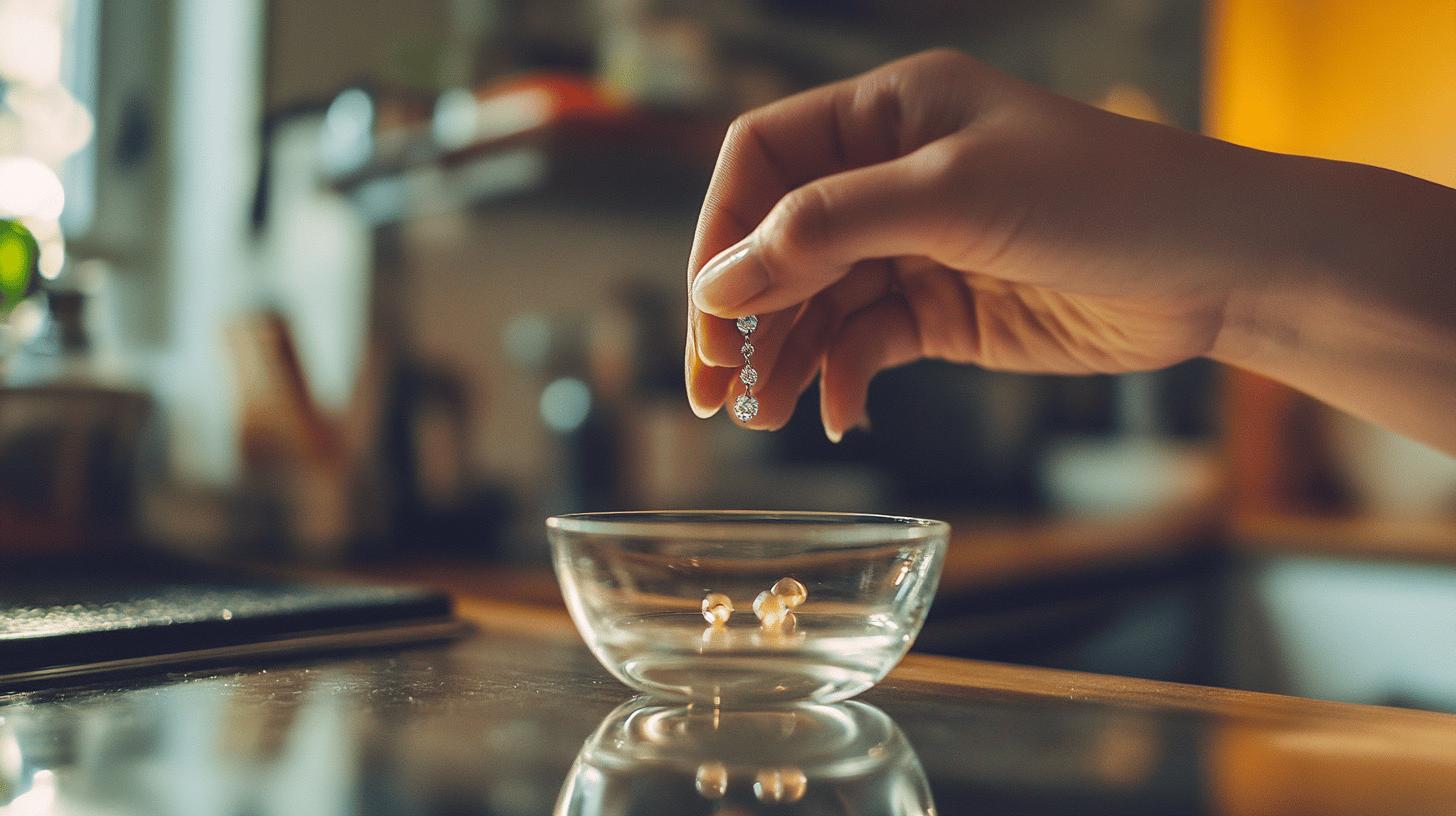
To clean new earrings at home, gather the following materials: a small dish, mild soap, warm water, a soft cloth, and a soft-bristled toothbrush. For disinfecting, you may also need hydrogen peroxide or a jewellery cleaning solution. These items ensure a thorough yet gentle cleaning process.
Start by placing your earrings in a small dish to prevent accidental drops and potential plumbing issues. Begin with a gentle cleanse using mild soap and warm water. Dip the earrings in the soapy water and use the soft toothbrush to gently scrub the surfaces. Focus on the posts, which can harbour the most bacteria. Rinse thoroughly with warm water to remove all soap residue.
For disinfecting, soak your earrings in hydrogen peroxide or a jewellery cleaning solution. Allow them to sit for about 20 minutes. This step is crucial for killing any remaining bacteria and ensuring the earrings are safe to wear. After soaking, rinse the earrings again with warm water and dry them completely using a soft cloth. Make sure there’s no moisture left to prevent any tarnishing.
A gentle approach is vital to avoid damaging your earrings. Avoid using abrasive materials or harsh chemicals, especially for delicate pieces. Regularly cleaning your earrings, especially the posts, ensures they remain bacteria-free and safe for your ears.
Suggested Read: Where to Buy Men’s Earrings – Top Recommendations
Cleaning Different Types of Earrings
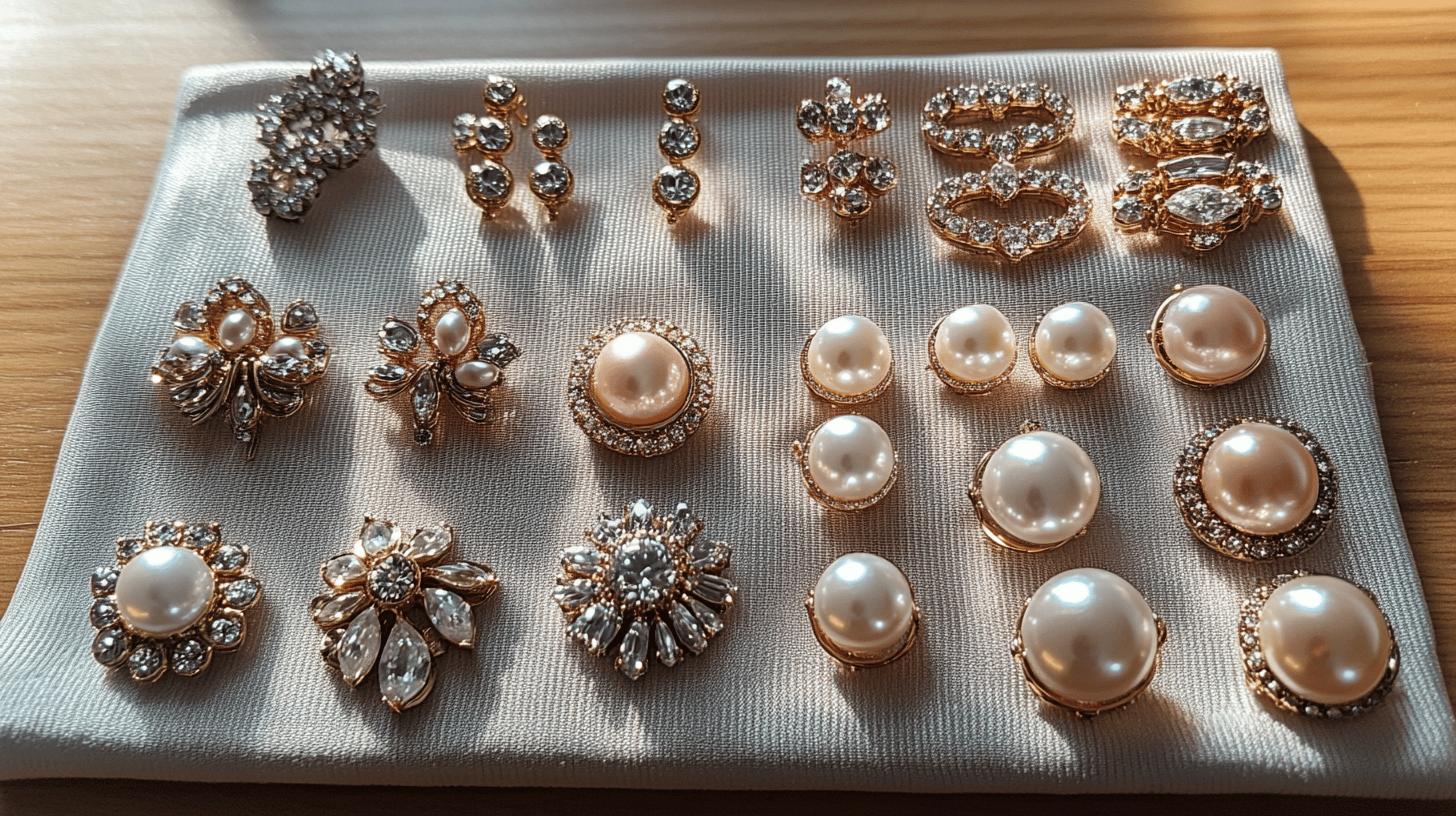
Knowing the material of your earrings is crucial for applying the correct cleaning method. Different materials require specific care to maintain their beauty and longevity.
Gold Earrings
Use a gentle cleaning solution and a soft cloth to clean gold earrings. Mix a few drops of mild dish soap with warm water and dip a soft cloth into the solution. Gently rub the earrings, paying special attention to any crevices. Rinse with warm water and dry thoroughly with a clean, soft cloth. Avoid abrasive materials that can scratch the gold.
Silver Earrings
For silver earrings, a mix of baking soda and warm water works well. Combine equal parts baking soda and warm water to form a paste. Apply the paste to the earrings using a soft cloth, rubbing gently to remove tarnish. Rinse with warm water and dry completely. This method helps restore the shine without causing damage.
Diamond Earrings
Diamond earrings require specific cleaning solutions. Use a mild jewellery cleaner designed for diamonds and a soft brush. Dip the earrings in the cleaner and gently brush the stones to remove any dirt or oil. Rinse with warm water and pat dry with a lint-free cloth. This ensures the diamonds remain sparkling and free from residue.
Pearl Earrings
Pearl earrings are delicate and need special care. Use mild soap and water, avoiding harsh chemicals that can damage the pearls. Dip a soft cloth in soapy water and gently wipe the pearls. Rinse with a damp cloth and dry immediately. Store pearls separately to prevent scratching.
- Use a gentle cleaning solution for gold earrings to avoid scratching.
- Clean silver earrings with a baking soda and warm water paste.
- Use a soft brush and a diamond-specific cleaner for diamond earrings.
- Clean pearl earrings with mild soap and water, avoiding harsh chemicals.
How to Clean Earring Backs and Posts
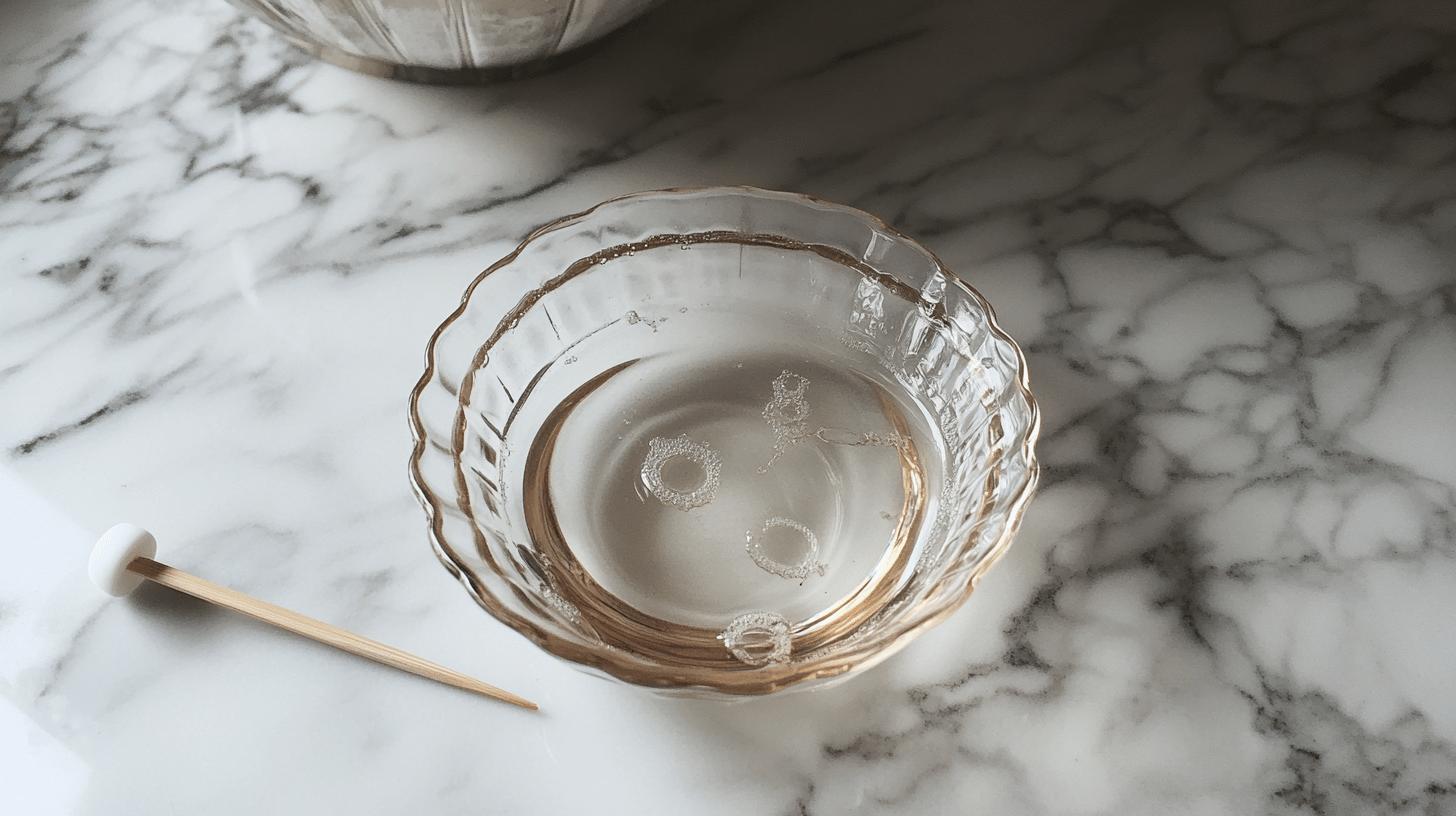
Earring backs and posts are often overlooked, yet they are crucial parts of your jewellery that come into direct contact with your skin. Over time, they can accumulate grime and bacteria from sweat, hair products, and environmental pollutants. This build-up can lead to skin irritations and infections if not cleaned regularly. Therefore, maintaining the cleanliness of these components is essential for both hygiene and the longevity of your earrings.
- Gather Materials: Mild soap, warm water, a small dish, a soft toothbrush, a toothpick, and a soft cloth.
- Soak in Cleaning Solution: Place the earring backs and posts in a small dish filled with a mild soap and warm water solution. Let them soak for a few minutes to loosen any dirt and grime.
- Scrub Gently: Use a soft toothbrush to gently scrub the earring backs and posts. Focus on the tiny crevices where dirt can accumulate.
- Use a Toothpick for Crevices: For hard-to-reach areas, use a toothpick to dislodge any remaining grime. Be gentle to avoid scratching the metal.
- Rinse Thoroughly: Rinse the earring backs and posts under warm water to remove any soap residue. Ensure all cleaning solution is washed away to prevent irritation.
- Dry Completely: Pat dry with a soft cloth and let them air dry completely before reassembling your earrings. Moisture can lead to tarnishing and bacteria growth.
Experts recommend cleaning earring backs and posts as often as possible. Ideally, give them a gentle cleanse before or after each wear. Regular cleaning helps prevent the build-up of harmful bacteria and ensures your earrings remain comfortable and safe to wear.
Disinfecting Earrings Without Alcohol
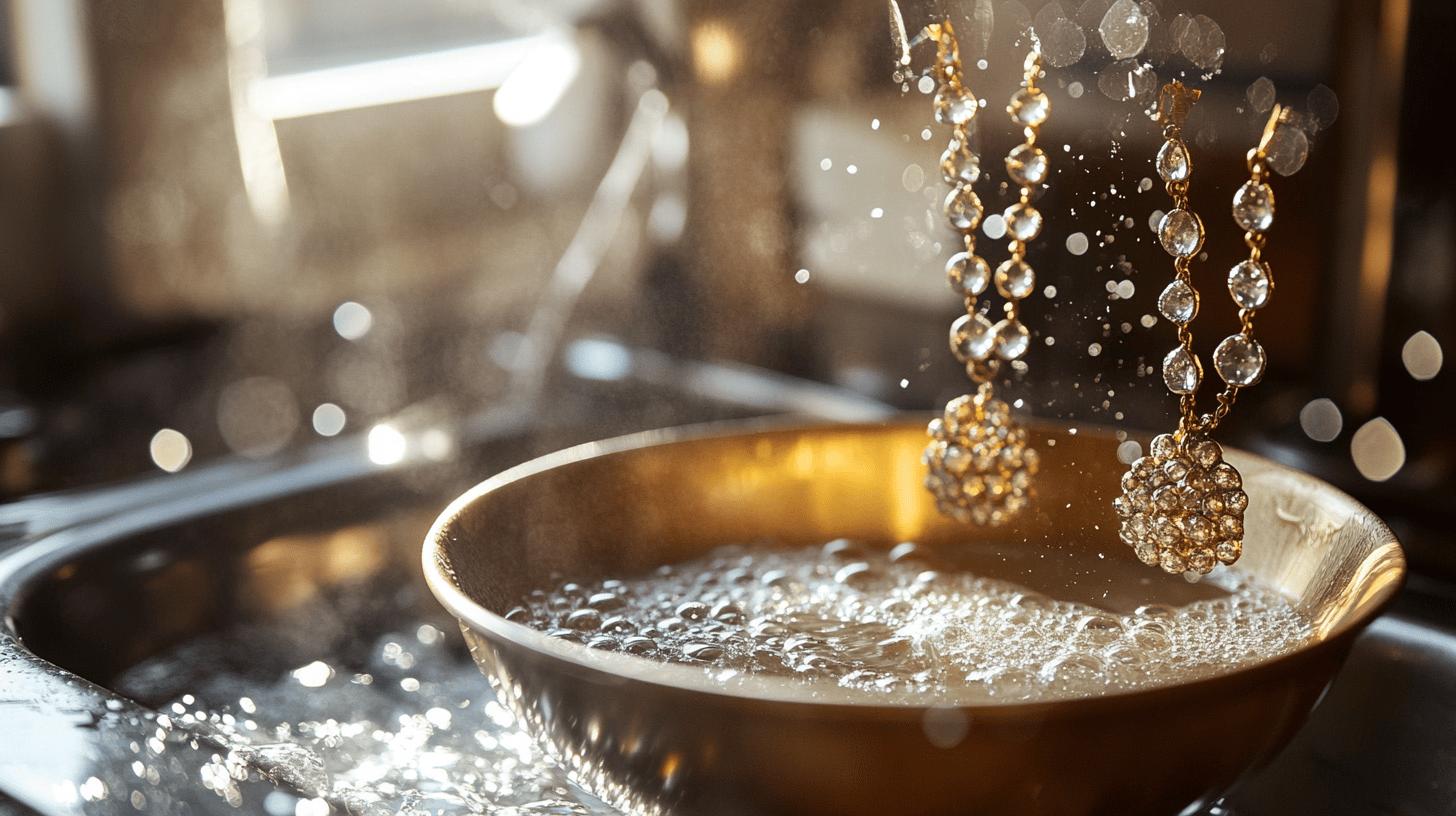
Non-alcohol-based cleaners offer a gentle yet effective way to disinfect earrings, making them suitable for those with sensitive skin or allergies to alcohol. These alternatives help maintain the integrity and shine of the earrings without causing potential damage or irritation.
To disinfect earrings using vinegar and baking soda, start by preparing a mixture of equal parts white vinegar and warm water. Add a small amount of baking soda to create a slightly fizzy solution. Soak the earrings in this mixture for up to three hours. The combination of vinegar’s natural acidity and baking soda’s mild abrasiveness will break down residues and eliminate bacteria. After soaking, rinse the earrings thoroughly with warm water and dry them completely with a soft cloth.
Hydrogen peroxide is another versatile cleaner for disinfecting earrings at home. Fill a small dish with hydrogen peroxide, enough to submerge the earrings fully. Let the earrings soak for about twenty minutes. This soaking time allows the hydrogen peroxide to kill germs and bacteria effectively. After soaking, rinse the earrings with warm water and pat them dry with a soft cloth to prevent any moisture retention.
Using these methods ensures that your earrings are disinfected without the need for alcohol, providing a safe and effective cleaning process.
Preventing Infections in New Piercings

Proper aftercare is crucial for newly pierced ears to prevent infections and ensure proper healing. Newly pierced ears are particularly susceptible to bacteria and dirt, which can lead to complications if not managed correctly. Keeping the piercing itself clean is essential for maintaining hygiene and promoting quick recovery. Neglecting aftercare can result in prolonged healing times and potential medical issues.
- Wash Hands Thoroughly: Always clean your hands with soap and water before touching your new piercing.
- Clean with Saline Solution: Use a saline solution or a piercing aftercare spray to clean the area two to three times a day.
- Avoid Rotating Jewellery: Do not twist or turn the earrings; this can cause irritation and introduce bacteria.
- Keep Hair and Products Away: Ensure that hair, shampoos, and other products do not come into contact with the piercing.
- Use a Soft Cloth: Gently pat the area dry with a clean, soft cloth after cleaning.
- Avoid Submersion in Water: Refrain from swimming in pools, lakes, or hot tubs to prevent bacterial contamination.
- Wear Hypoallergenic Earrings: Choose hypoallergenic materials like titanium or surgical steel to reduce the risk of allergic reactions.
Common signs of infection include redness, swelling, pain, and the presence of pus. If you notice any of these symptoms, it is important to take immediate action. Infections can exacerbate if left untreated, leading to more serious complications.
Seeking medical advice is imperative if the symptoms persist or worsen. A healthcare professional can provide appropriate treatment to manage the infection and ensure your ear heals correctly. Early intervention can prevent further issues and promote faster recovery.
Common Mistakes to Avoid When Cleaning New Earrings
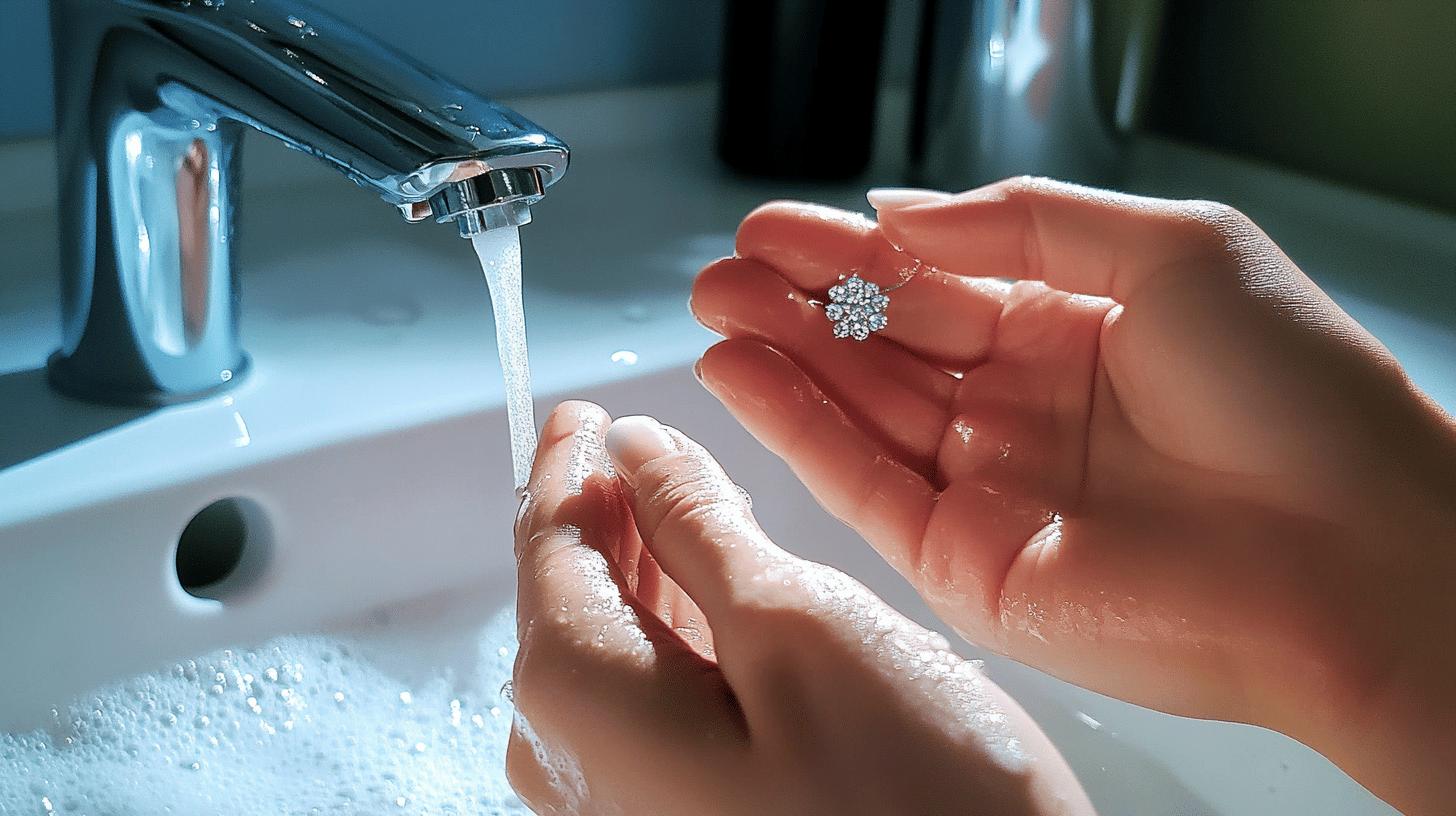
Cleaning new earrings is essential for maintaining their beauty and hygiene. Improper cleaning methods can lead to damage and reduce the lifespan of your jewellery. Identifying the metal and stone type of your earrings before cleaning is a fundamental step to ensure you use the correct method. Mistakes in this process can cause tarnishing, scratching, and even bacterial build-up.
Potential mistakes can significantly impact the longevity and hygiene of your earrings. Using the wrong cleaning solution or technique can damage delicate materials and stones. For example, using alcohol-based cleaners on pearls can strip their natural lustre, while abrasive materials can scratch gold and silver. Additionally, failing to clean thoroughly can leave behind residues that harbour bacteria, leading to skin irritation and infections.
- Using abrasive cleaners or brushes
- Submerging earrings with glued components in water
- Ignoring the type of metal or stone
- Using harsh chemicals on delicate materials
- Not rinsing thoroughly after cleaning
- Failing to dry completely, leading to tarnishing
Following best practices ensures that your earrings remain in pristine condition and safe to wear. Always use gentle cleaning solutions appropriate for the specific material of your earrings. Rinse thoroughly and dry completely to prevent residue build-up and potential damage. Regular maintenance helps retain the shine and hygiene of your jewellery, making it last longer and stay beautiful.
Final Words
Properly cleaning new earrings is crucial to maintain their beauty and hygiene. Starting by recognising the importance of sanitising, the guide elaborated on different methods to maintain cleanliness for various earring types. Detailed instructions for at-home cleaning ensured ease and safety.
Knowing how to clean new earrings, including their backs and posts, prevents potential infections, especially in new piercings.
By following the outlined steps and avoiding common cleaning mistakes, you can enjoy stylish and safe accessories. Always prioritise clean practices to keep your earrings and piercings healthy and sparkling.
FAQ
Should you clean new earrings before wearing them?
New earrings should be cleaned before wearing them as they might have manufacturing residues and bacteria. Thorough cleaning reduces the risk of irritation and infection.
How to clean new earrings without rubbing alcohol?
Hydrogen peroxide, soap and water, or a jewellery cleaner can be used to clean new earrings without rubbing alcohol. Rinse with warm water and dry thoroughly.
How to clean new earrings at home?
To clean new earrings at home, use soap and warm water, hydrogen peroxide, or a jewellery cleaner. Gently scrub, rinse, and dry completely to ensure they are sanitised.
How to clean stud earrings?
Stud earrings can be cleaned by soaking in a mild soap and water solution, gently scrubbing with a soft brush, and rinsing. Dry thoroughly to prevent moisture-related damage.
How to sterilize earrings with salt?
To sterilise earrings with salt, dissolve salt in warm water and soak the earrings for 10-15 minutes. Rinse with clean water and dry completely.
Rubbing alcohol to clean earrings?
Rubbing alcohol can effectively clean earrings by sterilising them. Soak the earrings in alcohol for a few minutes, then rinse and dry.
How to clean earrings that turned black?
Clean blackened earrings using baking soda and water paste. Apply the paste, gently scrub, rinse, and dry. This can help restore their original shine.
How to clean earring backs?
Earring backs can be cleaned by soaking in a cleaning solution, gently scrubbing with a brush or toothpick, rinsing with warm water, and drying completely.
How do you clean new earrings before you wear them?
Clean new earrings before wearing by washing with soap and water, hydrogen peroxide, or a jewellery cleaner. Rinse with warm water and dry completely.
How do you clean earrings after getting them?
After getting earrings, clean them with hydrogen peroxide, a mild soap, or a jewellery cleaner. Rinse thoroughly with warm water and dry to prevent irritation.
Should I clean earrings after buying them?
Yes, earrings should be cleaned after buying to remove any residues or bacteria from manufacturing and handling. This ensures they are safe and hygienic.
How do you clean new earrings without alcohol?
Clean new earrings without alcohol by using hydrogen peroxide, mild soap and water, or a commercial jewellery cleaner. Rinse with warm water and ensure they are completely dry.

